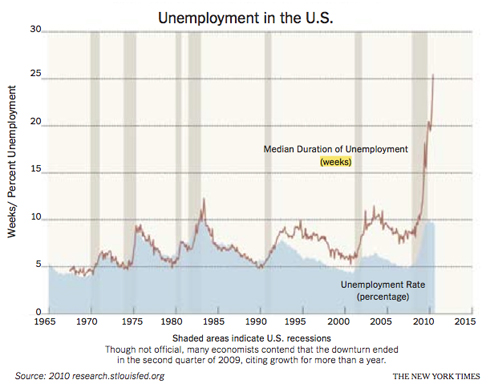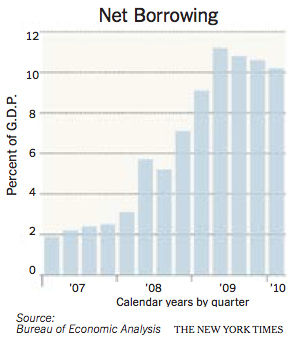When you consistently irritate the hard right in the United States as I do, you quickly get used to the steady stream of accusations that you’re lying, simply because you didn’t present the facts in a way that suits the commenter. If I write, “The economy added 236,000 jobs a month under Bill Clinton,” the responses from conservatives will range from “That’s a lie! Krugman doesn’t mention the dot-com bubble!” to “That’s cherry-picking! What about Jimmy Carter?”
Recently, I’ve also noticed a peculiar argument surfacing here and there — the assertion that people like me are exaggerating the current financial difficulties in the United States, and that things were actually worse in the 1970s and 1980s. I wonder where that’s coming from — these views are oddly similar to those disseminated on talk radio.
The simple truth is that this recession really was the big one. Catherine Rampell, who edits the Economix blog on The New York Times Web site, recently offered an updated chart comparing this recession and others since 1970. The data show that since December 2007, when the current downturn began, the economy has lost about 5.4 percent of its nonfarm payroll jobs. Compared to declines in employment during other recessions since 1970, this one is indeed No. 1.
But you might ask: Wasn’t the unemployment rate higher in the past? Well, if you look at the graphic on this page, you’ll see that in 1982 it was briefly a bit higher than the peak this cycle. But back then most unemployment was short-term — nothing like the deeply corrosive long-term unemployment we’re facing now. So these really are the worst of times.
Our readers are our only financial backers – keep Truthout afloat by supporting us today.
But that’s not to say there are no historically rooted deceptions out there — the latest being the official Republican stance that President George W. Bush left behind a budget that was in pretty good shape.
Republican Mitch McConnell, the Senate minority leader from Kentucky, said in late July in an interview with CNN that during “the last year of the Bush administration, the deficit as a percentage of gross domestic product was 3.2 percent, well within the range of what most economists think is manageable. A year and a half later, it’s almost 10 percent.”

So where’s the deception? First, the Republicans are hoping that most people won’t know that standard budget data is presented in fiscal years, which start on October 1 of the previous calendar year. So what they’re talking about isn’t actually the “last year of the Bush administration” — they’ve conveniently lopped off everything that happened after the Lehman Brothers collapse —Troubled Asset Relief Program and all.
Second, they’re hoping that people won’t look at what has been happening quarter by quarter. Consider the graphic on this page showing net federal borrowing as a  percentage of G.D.P., quarter by quarter, since 2007. Can we agree that the deficit in the first quarter of 2009 — recall that Barack Obama didn’t take office until Jan. 20, the American Recovery and Reinvestment Act wasn’t passed until Feb. 17 and, essentially, no stimulus funds had been spent — had nothing to do with Obama’s polices, and was entirely a Bush legacy? Yet the deficit had already surged to almost 9 percent of G.D.P. Even in the second quarter of 2009, according to the graphic, Obama’s policies had barely begun to take effect, and the deficit was already over 10 percent of G.D.P.
percentage of G.D.P., quarter by quarter, since 2007. Can we agree that the deficit in the first quarter of 2009 — recall that Barack Obama didn’t take office until Jan. 20, the American Recovery and Reinvestment Act wasn’t passed until Feb. 17 and, essentially, no stimulus funds had been spent — had nothing to do with Obama’s polices, and was entirely a Bush legacy? Yet the deficit had already surged to almost 9 percent of G.D.P. Even in the second quarter of 2009, according to the graphic, Obama’s policies had barely begun to take effect, and the deficit was already over 10 percent of G.D.P.
What this chart really tells us is that the deficit is overwhelmingly the result of the economic slump, not Obama policies. But the usual suspects want to fool you.
Truthout has licensed this content. It may not be reproduced by any other source and is not covered by our Creative Commons license.
Paul Krugman joined The New York Times in 1999 as a columnist on the Op-Ed page and continues as a professor of economics and international affairs at Princeton University. He was awarded the Nobel in economic science in 2008.
Mr Krugman is the author or editor of 20 books and more than 200 papers in professional journals and edited volumes, including “The Return of Depression Economics” (2008) and “The Conscience of a Liberal” (2007).
Copyright 2010 The New York Times.
Join us in defending the truth before it’s too late
The future of independent journalism is uncertain, and the consequences of losing it are too grave to ignore. To ensure Truthout remains safe, strong, and free, we need to raise $46,000 in the next 7 days. Every dollar raised goes directly toward the costs of producing news you can trust.
Please give what you can — because by supporting us with a tax-deductible donation, you’re not just preserving a source of news, you’re helping to safeguard what’s left of our democracy.
